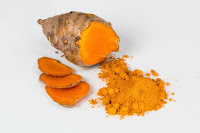8 Turmeric Side Effects if Consumed Excessively
Despite being known as the rhizomes with myriad of benefits a surprising negative side effects still exist when it’s consumed excessively. Not only is it used as a spice seasoning, turmeric has also been used as traditional herb drinks for a long time.

Especially since the spread of Covid-19, turmeric and other herbs was
in high demand in the market. But did you know that despite its many benefits,
an excessive consumption of turmeric is still not good?
This is because turmeric has a lot of active substances in it. Here are
some of the side effects that we should pay attention to, as summarized by
theAsianparent:
Some of the side effects of excessive turmeric consumption
1. Digestive irritation
The first negative side effect of turmeric is that it can cause
irritation for your digestive systems. Despite known as having a substance that
boosts human’s digestive health, an excessive dosage can cause irritation
instead because turmeric will stimulate the stomach to produces excess acid.
2. Headache and nausea
Another turmeric side effect is in the form of headache and nausea.
This side effect can happen when it’s consumed in high dosage, for example over
450 milligrams each day.
3. Low blood sugar levels.
Curcumin, the active
substance in turmeric can reduce your blood sugar level for diabetic. Thus,
those that aren’t diabetic should be careful when consuming turmeric as it can
cause the blood sugar in your body to drop into a dangerous threshold.
4. Side effect in the form of impotency
If consumed orally by a man, turmeric can lower the amount of
testosterone and sperm produced by the body. This can potentially cause
impotency. So, for the couples that’s planning for pregnancy should limit the
amount of turmeric consumed.
5. Side effect in the form of anemia
Consuming turmeric in high dosage can hinder iron absorption in the
body. Meanwhile iron is needed for the body metabolism in the order to prevent anemia.
If someone is anemic or suffering from low blood levels, it’s best to not
consume turmeric too much.
6. Potentially dangerous side effect for the liver
Turmeric contains 2% of oxalate. This substance can cause gallstones if
consumed excessively. Gallstones itself can cause pain and discomfort.
7. Causes contraction
Another side effect of turmeric is that it’s believed to cause
contraction. This can increase the risks of premature childbirth. Although
there’s not many scientific proofs regarding this matter, turmeric consumption
on pregnant woman should still be limited. This is because turmeric can dilute
blood in a person. Consumption of supplements and or herbs made from turmeric
is very not recommended. But, a small amount of turmeric as a seasoning spice
should proves no problem.
8. Aggravate gluten intolerance symptoms
Commercially sold turmeric powder have also been found to contain
additional ingredients such as cassava flour, wheat, barley, and rye. To those
suffering from celiac where they’re intolerant to gluten, the addition of
flour, barley, and rye can surely trigger negative side effects.
The conclusion about turmeric’s side effects
Turmeric is actually quite safe when consumed directly (not in the form
of supplements, etc.) and especially when it’s freshly acquired and only used
for short-term benefits. Turmeric products that contain 8gr of curcumin is still safe to be consumed
daily in the period of 2 months. Furthermore, the consumption of 3gr of
turmeric is still relatively safe if it only lasts for 3 months.
The consumption of turmeric is generally relatively safe. Those that show
stomach-ache, headache and other side effects are only the people that consumed
it in excessive dosage. Now, who should limit their turmeric consumption?
The answer is those that has a disease or another condition. They
should consult with their doctor before deciding on consuming turmeric. Some of
those people are:
• People with biliary
disease
• Diabetes mellitus
patients
• People with
blood-related disease or coagulation
• Anemic people
• Gastro esophageal
reflux disease (GERD)
• Endometriosis
• Breast cancer, womb
cancer and ovarian cancer
• Pregnant and
breastfeeding woman.
☕ note


Nice article
ReplyDeleteNice blog
ReplyDelete